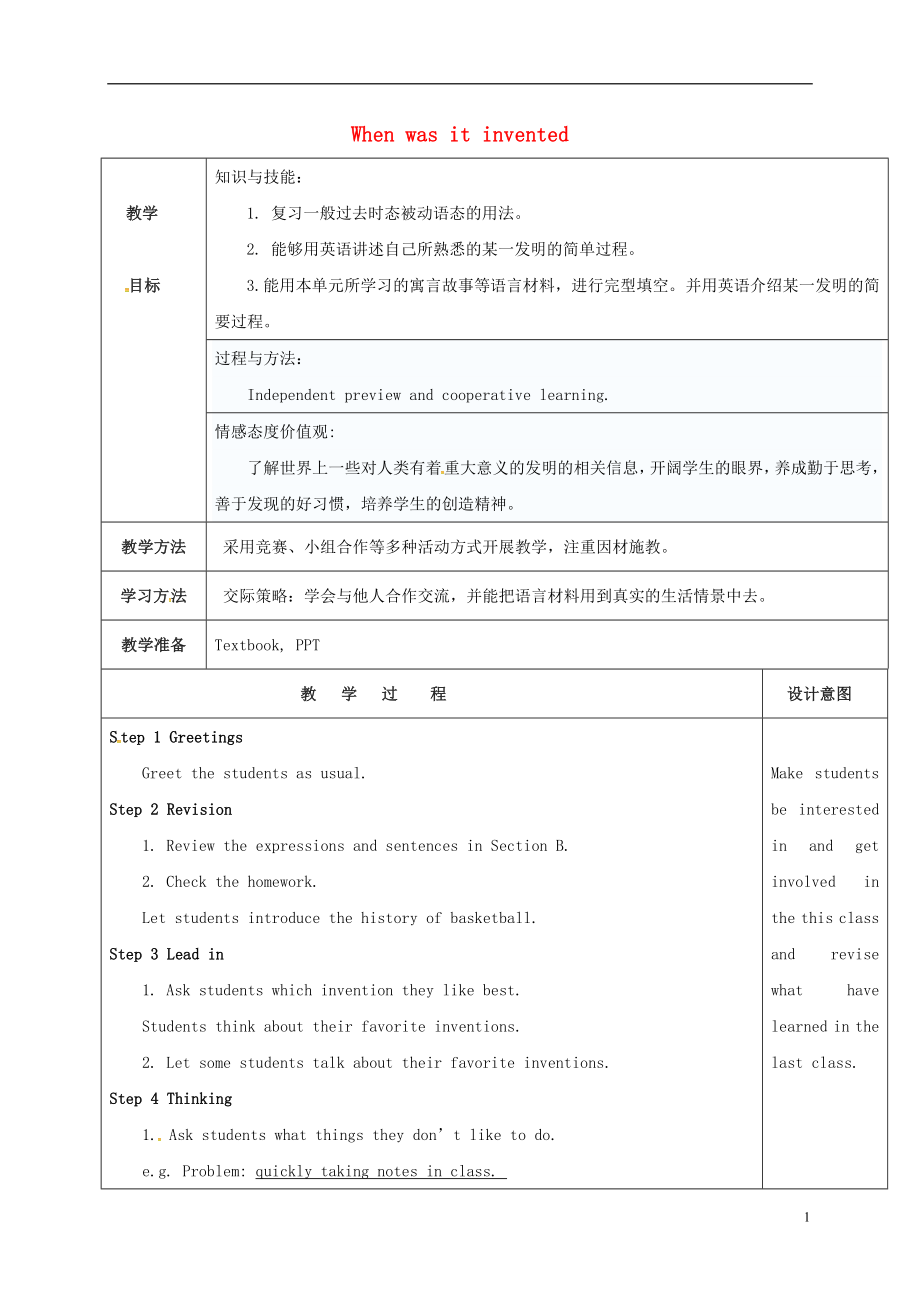《陜西省延安市富縣羊泉鎮(zhèn)九年級(jí)英語(yǔ)全冊(cè) Unit 6 When was it invented Section B 3a-self check教案 (新版)人教新目標(biāo)版》由會(huì)員分享,可在線閱讀�,更多相關(guān)《陜西省延安市富縣羊泉鎮(zhèn)九年級(jí)英語(yǔ)全冊(cè) Unit 6 When was it invented Section B 3a-self check教案 (新版)人教新目標(biāo)版(3頁(yè)珍藏版)》請(qǐng)?jiān)谘b配圖網(wǎng)上搜索���。
1�����、
When was it invented
教學(xué)
目標(biāo)
知識(shí)與技能:
1. 復(fù)習(xí)一般過(guò)去時(shí)態(tài)被動(dòng)語(yǔ)態(tài)的用法。
2. 能夠用英語(yǔ)講述自己所熟悉的某一發(fā)明的簡(jiǎn)單過(guò)程��。
3. 能用本單元所學(xué)習(xí)的寓言故事等語(yǔ)言材料�����,進(jìn)行完型填空����。 并用英語(yǔ)介紹某一發(fā)明的簡(jiǎn)要過(guò)程����。
過(guò)程與方法:
Independent preview and cooperative learning.
情感態(tài)度價(jià)值觀:
了解世界上一些對(duì)人類有著重大意義的發(fā)明的相關(guān)信息,開(kāi)闊學(xué)生的眼界,養(yǎng)成勤于思考�,善于發(fā)現(xiàn)的好習(xí)慣��,培養(yǎng)學(xué)生的創(chuàng)造精神。
教學(xué)方法
采用競(jìng)賽、小組合作等多種活動(dòng)方式
2、開(kāi)展教學(xué)�����,注重因材施教�����。
學(xué)習(xí)方法
交際策略:學(xué)會(huì)與他人合作交流�����,并能把語(yǔ)言材料用到真實(shí)的生活情景中去���。
教學(xué)準(zhǔn)備
Textbook, PPT
教 學(xué) 過(guò) 程
設(shè)計(jì)意圖
Step 1 Greetings
Greet the students as usual.
Step 2 Revision
1. Review the expressions and sentences in Section B.
2. Check the homework.
Let students introduce the history of basketba
3、ll.
Step 3 Lead in
1. Ask students which invention they like best.
Students think about their favorite inventions.
2. Let some students talk about their favorite inventions.
Step 4 Thinking
1. Ask students what things they don’t like to do.
e.g. Problem: quickly taking not
4、es in class.
2. Discuss in groups and think of an invention that could help you.
e.g. New invention: a special pen
What it is used for: taking notes quickly in class
3. Students discussing the problems and try to make their own notes.
4. Let some students read their no
5���、tes to the class.
Step 5 Writing
Work on 3b
1. Tell students to write a description of their new invention.
2. The following sentence structures may help you.
常用句型:
1)I think … is a very useful invention. 我認(rèn)為……是一項(xiàng)很有用的發(fā)明����。
2) … was invented by… ……是由……(某人)發(fā)明的
3) … was invented in
6、… ……是在……(某時(shí)間)發(fā)明的
4) It was used for… 它被用來(lái)……
5) … is made of… 是由……(材料)制成的
Step 6 Self Check
Work on Self Check 1
1. Read the words in the box and make sure they know the meaning of each word.
2. Read the passage and try to fill in the blanks with the proper word.
3. Read
7����、the passage again. Check if the forms of the words are correct.
4. Let some students read their answers. Correct the mistakes.
Work on Self Check 2
1. Tell students to rewrite the sentences using the passive voice.
2. 方法指導(dǎo):復(fù)習(xí)一般過(guò)去時(shí)態(tài)的被動(dòng)語(yǔ)態(tài)的句子結(jié)構(gòu);復(fù)習(xí)將主動(dòng)語(yǔ)態(tài)句子變?yōu)楸粍?dòng)語(yǔ)態(tài)句子的過(guò)程���。
3. Students work by t
8���、hemselves and try to rewrite the sentences.
4. Check the answers with the class.
Work on Self Check 3
Find out information about an invention you would like to know more about and write sentences below.
Invention: ________;When: ___________�;Who: __________;Purpose: ________.
Step 7 Revisio
9���、n
If time is enough, let the students do the excercises on the workbook.
Step 8 Homework
Sum up what they have learned in this unit.
Make students be interested in and get involved in the this class and revise what have learned in the last class.
By practicing writing, students’
10����、speaking and writing abilities can be improved.
板書(shū)
設(shè)計(jì)
Unit 6 When was it invented?
一般過(guò)去時(shí)的被動(dòng)語(yǔ)態(tài):be+動(dòng)詞的過(guò)去分詞
Writing Instructions:
1)I think … is a very useful invention. 我認(rèn)為……是一項(xiàng)很有用的發(fā)明。
2) … was invented by… ……是由……(某人)發(fā)明的
3) … was invented in… ……是在……(某時(shí)間)發(fā)明的
4) It was used for… 它被用來(lái)……
5) … is made of… 是由……(材料)制成的
教
后
反
思
3
 陜西省延安市富縣羊泉鎮(zhèn)九年級(jí)英語(yǔ)全冊(cè) Unit 6 When was it invented Section B 3a-self check教案 (新版)人教新目標(biāo)版
陜西省延安市富縣羊泉鎮(zhèn)九年級(jí)英語(yǔ)全冊(cè) Unit 6 When was it invented Section B 3a-self check教案 (新版)人教新目標(biāo)版

